Detailed Meghalaya Travel Guide in August – Weather, How to Plan, How to Reach, Places to Visit, Itinerary
A trip to Meghalaya in August offers an immersive monsoon experience. It combines adventure, culture, and nature’s raw beauty. During this month, the state is at its most vibrant. The hills come alive with verdant greenery, waterfalls thunder with unmatched intensity, and mist blankets the valleys, creating an exquisite atmosphere.
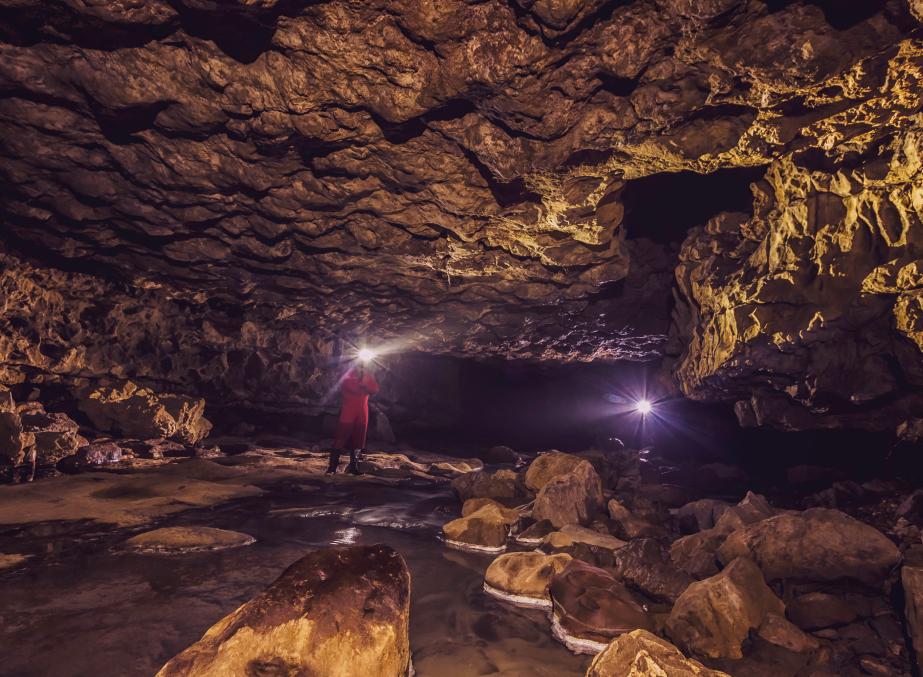
August is perfect for those who embrace the beauty of rain. The monsoon enhances the charm of trekking trails, rivers, and villages. It offers an authentic connection to Meghalaya’s untouched nature and vibrant culture. From exploring serene waterfalls to discovering Khasi traditions, this Meghalaya travel guide will help you make the most of your journey through one of India’s most enchanting destinations.
Meghalaya Weather in August
The weather in Meghalaya during August is an appealing mix of heavy rainfall, cool temperatures, and misty mornings. Daytime temperatures range from 15°C to 22°C. This ensures a pleasant climate for sightseeing when the rain subsides. The mornings often begin with drizzles, followed by intermittent downpours that drench the lush hills. Thus, making everything around look alive and rejuvenated.
While the rains can make certain trails slippery, they also create an ethereal environment. Mist veils the valleys, adding a mystical allure to destinations like Laitlum Canyons and Cherrapunji. This Meghalaya travel guide in August ensures you embrace nature’s paradise with a love for monsoon magic.
How to Plan a Trip to Meghalaya in August
1. Duration of Stay
A 7–9 day Meghalaya trip in August is ideal to cover Shillong, Cherrapunji, Dawki, Mawlynnong, Jowai, and offbeat gems like Mawphlang Sacred Grove.
2. Budget Planning
Accommodation
Budget hotels and homestays range from ₹1,000–1,800 per night, while premium hotels can cost ₹6,000–8,000 per night.
Local Travel
Private taxis cost INR 2,500–3,500 per day. Shared cabs are a budget-friendly option for point-to-point travel. Options for two-wheelers are also available. You can rent for ₹500-600 per day.
Activities
Entry fees to waterfalls, caves, and parks cost between ₹100–500. Guided treks may cost ₹1,500–3,000 depending on the trail.
3. Packing Essentials
Waterproof jackets, sturdy trekking shoes with good grip, and a foldable umbrella.
Waterproof bags for electronics and extra socks to combat wet conditions.
Mosquito repellents, sunscreen, and light woolens for cool evenings.
4. Advance Bookings
August is a great time for monsoon tourism, so pre-book accommodations and transport 3–4 weeks in advance to avoid last-minute hassles.
Meghalaya Travel Guide Itinerary for August – A Day-by-Day Exploration
Day 1-2: Shillong
Begin your journey in Shillong. This vibrant capital and a perfect starting point for your trip to Meghalaya in August.
On your first day, explore Ward’s Lake. It is a serene oasis surrounded by lush gardens and rain-kissed blooms. Enjoy a peaceful boat ride or take a leisurely stroll around the lake. Head to Lady Hydari Park, an ideal spot for families, featuring colourful flower beds and a mini zoo.
On the second day, immerse yourself in Khasi culture at the Don Bosco Museum. It offers fascinating exhibits on art, traditions, and history. Next, visit Shillong Peak, the city’s highest viewpoint, where mist and rain create a magical ambiance. Conclude your day with shopping and street food at Police Bazaar, the city’s bustling market.
Activities
Boating and walking at Ward’s Lake.
Learning about Khasi culture at the Don Bosco Museum.
Shopping for souvenirs at Police Bazaar.
Travel Tip: Carry a light raincoat or umbrella, as Shillong experiences frequent showers in August.
Day 3-4: Cherrapunji – Nature’s Monsoon Symphony
Travel 54 km (2 hours) to Cherrapunji, a monsoon haven known for its abundant rain.
Start with Nohkalikai Falls. It is India’s tallest plunge waterfall, which flows at its peak during this season. Next, trek to the iconic Double-Decker Living Root Bridge. This is an engineering marvel set amidst lush, rain-fed forests. This trek takes about 3–4 hours one way and rewards you with a unique blend of natural and human-made wonders.
On the second day, explore the mysterious Mawsmai Caves, where rainwater enhances the glistening limestone formations. End your day at Thangkharang Park. Enjoy peaceful moments and misty views of the Bangladesh plains.
Activities
Trekking to the Double-Decker Living Root Bridge.
Waterfall viewing at Nohkalikai Falls.
Exploring limestone caves and scenic parks.
Meghalaya Travel Guide Tip: Wear waterproof trekking shoes with a good grip, as trails can be slippery during the monsoon.
Day 5: Dawki and Mawlynnong
Dawki, 82 km (2.5 hours) from Shillong, is your first stop. Here, take a serene boat ride on the Umngot River, surrounded by lush green hills. Even though the river may not be as clear during the rains, its peaceful surroundings make it a must-visit.
From Dawki, head 35 km (1 hour) to Mawlynnong. It is Asia’s cleanest village. Walk through its pristine streets, visit the Living Root Bridge, and climb the Sky View Tower for stunning views of the rain-soaked forests and the Bangladeshi plains. This village offers an eco-friendly and sustainable way of life that’s inspiring to witness.
Activities
Boating on the Umngot River.
Exploring the eco-friendly charm of Mawlynnong.
Admiring views from the Sky View Tower.
Meghalaya Travel Guide Tip: Savor traditional Khasi dishes like smoked meat and bamboo shoot curry at local homestays or eateries in Mawlynnong.
Day 6: Jowai and Krang Suri Falls
Begin with a trek to Krang Suri Falls. This is one of Meghalaya’s most enchanting waterfalls. Surrounded by vibrant greenery, the falls are at their most magnificent in August. Take a refreshing dip in the natural pool at its base or simply relax by the cascades.
Afterwards, visit Thadlaskein Lake. It is a tranquil spot ideal for picnics and quiet walks. Steeped in local folklore, this lake provides a glimpse into the cultural significance of the region.
Activities
Trekking to Krang Suri Falls.
Picnicking and relaxing at Thadlaskein Lake.
Meghalaya Travel Guide Tip: Keep waterproof bags handy to protect your belongings while trekking near waterfalls.
Day 7: Mawphlang Sacred Grove and Laitlum Canyons
Start your day with a guided tour of Mawphlang Sacred Grove. It is located 25 km (1 hour) from Shillong. This ancient forest is deeply revered by the Khasi community and is a treasure trove of biodiversity. Learn about its spiritual significance, myths, and unique flora.
In the afternoon, head to Laitlum Canyons. This is a breathtaking destination known as the “End of the World.” Mist-shrouded cliffs and deep gorges offer awe-inspiring views. Trekking to the canyon’s edge lets you experience Meghalaya’s dramatic landscapes up close.
Activities
Exploring Mawphlang Sacred Grove with a guide.
Trekking and photography at Laitlum Canyons.
Meghalaya Travel Guide Tip: Visit Laitlum in the afternoon for clearer views, as mornings are often foggy in August.
Day 8: Departure – A Relaxing Goodbye
Spend your final morning exploring Iewduh Market. It is one of the largest traditional markets in Northeast India. Pick up unique souvenirs like handwoven Khasi shawls, organic tea, and bamboo crafts.
Conclude your trip with a relaxing meal at a café in Police Bazaar, reflecting on your unforgettable journey before heading back to Guwahati.
Activities
Shopping for souvenirs at Iewduh Market.
Enjoying local delicacies at Shillong’s cafés.
Meghalaya Travel Guide Tip: Start your journey back to Guwahati early to account for monsoon traffic and possible delays.
Best Places to Visit in Meghalaya in August
1. Shillong
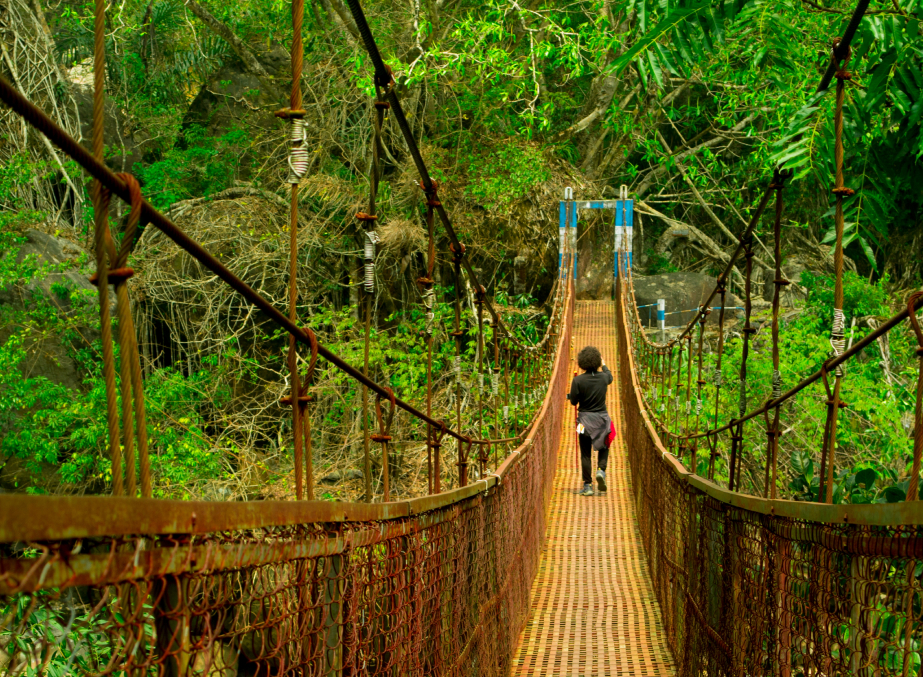
Often referred to as the “Scotland of the East,” it takes on a magical charm in August. This capital city is the gateway to Meghalaya and offers a blend of colonial heritage, natural beauty, and vibrant culture. As rain drizzles over its streets, the city transforms into a misty haven, perfect for those seeking serenity.
Ward’s Lake
Located in the heart of the city, this artificial lake is surrounded by manicured gardens and vibrant blooms. A peaceful walk along its perimeter or a paddle boat ride on the lake is a must.
Shillong Peak
This is the city’s highest point and offers breathtaking views of Shillong and its surrounding hills. Though misty in August, it’s worth visiting for the occasional clear glimpse of the valleys below.
Don Bosco Museum
An immersive experience awaits at this museum. You can learn about the diverse cultures, art, and history of Northeast India.
Lady Hydari Park
This family-friendly spot features colourful flower beds, a small zoo, and plenty of shaded areas to relax amidst nature.
2. Cherrapunji
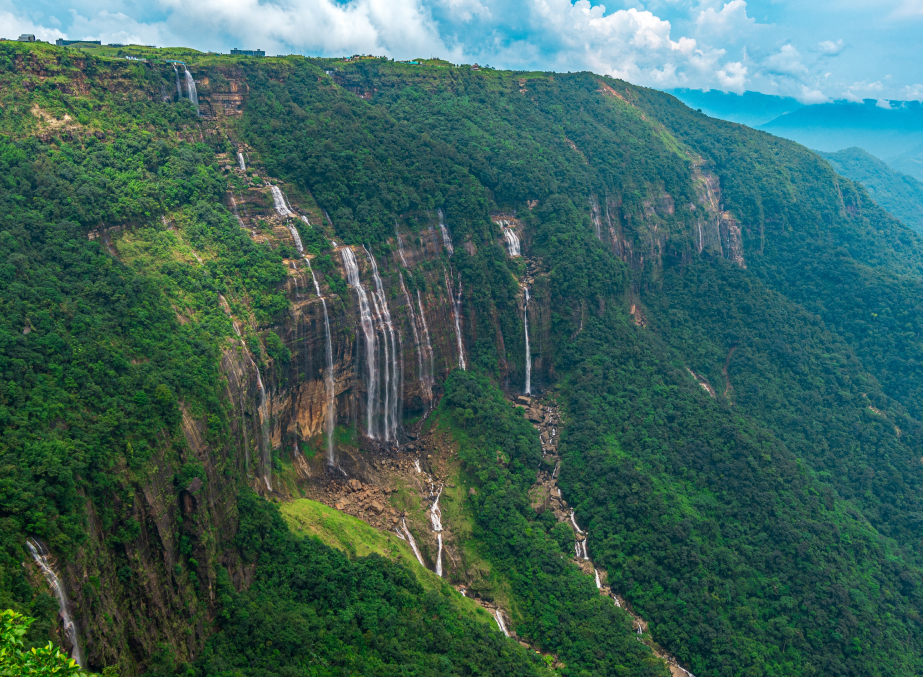
This Meghalaya tourist place is famous for its record-breaking rainfall, making August one of the best months to visit. The abundant rains breathe life into its waterfalls and lush landscapes, offering visitors an awe-inspiring experience.
Nohkalikai Falls
One of the tallest plunge waterfalls in India, this natural wonder is at its peak during August. The water cascades from a height of 340 meters and creates a stunning pool below.
Double-Decker Living Root Bridge
It is a unique marvel of bioengineering. This bridge is crafted from the roots of rubber trees by Khasi tribes. The trek to this bridge takes you through dense, rain-drenched forests and picturesque villages.
Mawsmai Caves
These limestone caves are an adventure of their own, featuring naturally carved chambers and glistening stalactites and stalagmites.
Thangkharang Park
This peaceful park offers stunning views of the Bangladeshi plains, especially when the mist momentarily clears.
3. Dawki
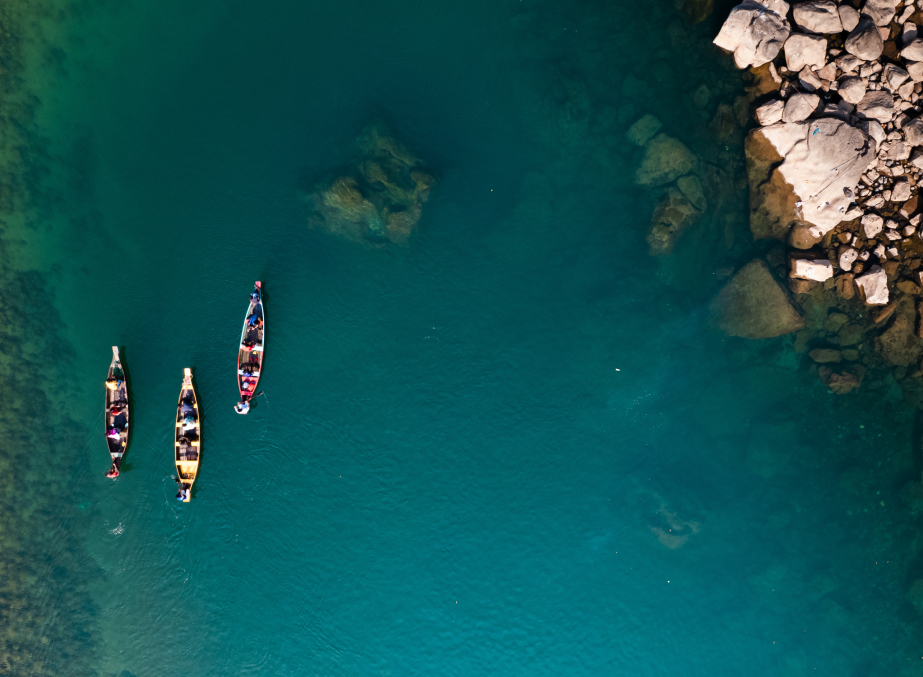
This is a small town near the Indo-Bangladesh border and is a tranquil retreat in Meghalaya. While the Umngot River may lose its signature crystal-clear appearance in August, it remains a serene spot surrounded by rolling hills and greenery.
Umngot River
Enjoy a peaceful boat ride along this rain-fed river, where the scenic beauty of the surrounding hills adds to the charm.
Indo-Bangladesh Border
A quick visit to the border at Tamabil is a unique cultural experience, showcasing a blend of Indian and Bangladeshi influences.
4. Mawlynnong
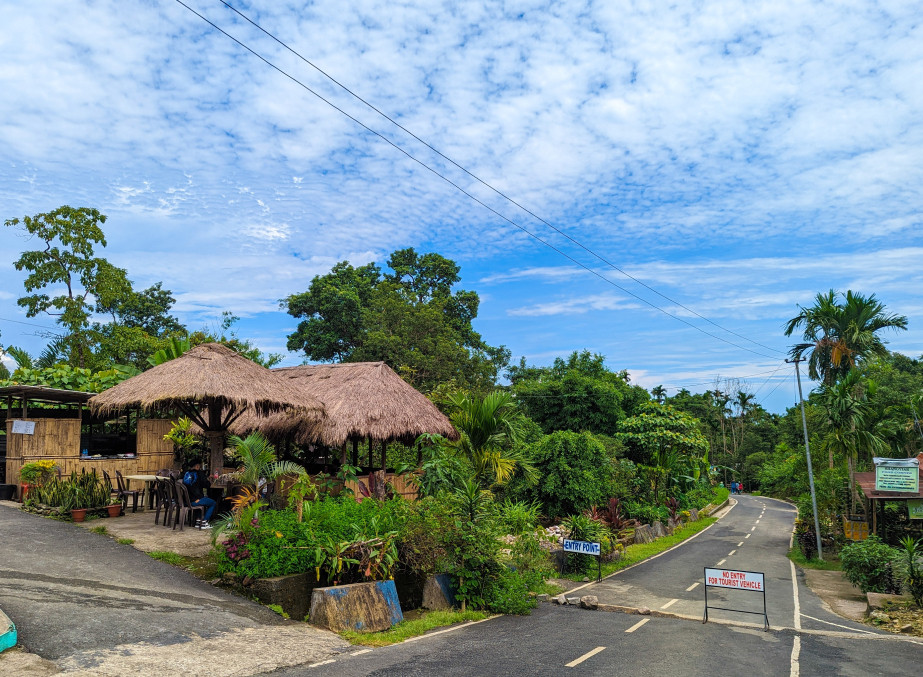
Often called “God’s Own Garden,” it is renowned for its cleanliness and eco-friendly practices. In August, the village looks like a vibrant postcard, with rain-kissed flowers and greenery enhancing its beauty.
Living Root Bridge
Just outside Mawlynnong, this smaller but equally impressive root bridge is easily accessible and surrounded by lush greenery.
Sky View Tower
Built from bamboo, this tower provides panoramic views of the surrounding rain-drenched forests and the Bangladeshi plains.
Village Walks
The spotless streets and eco-conscious practices are a joy to explore on foot.
5. Krang Suri Falls
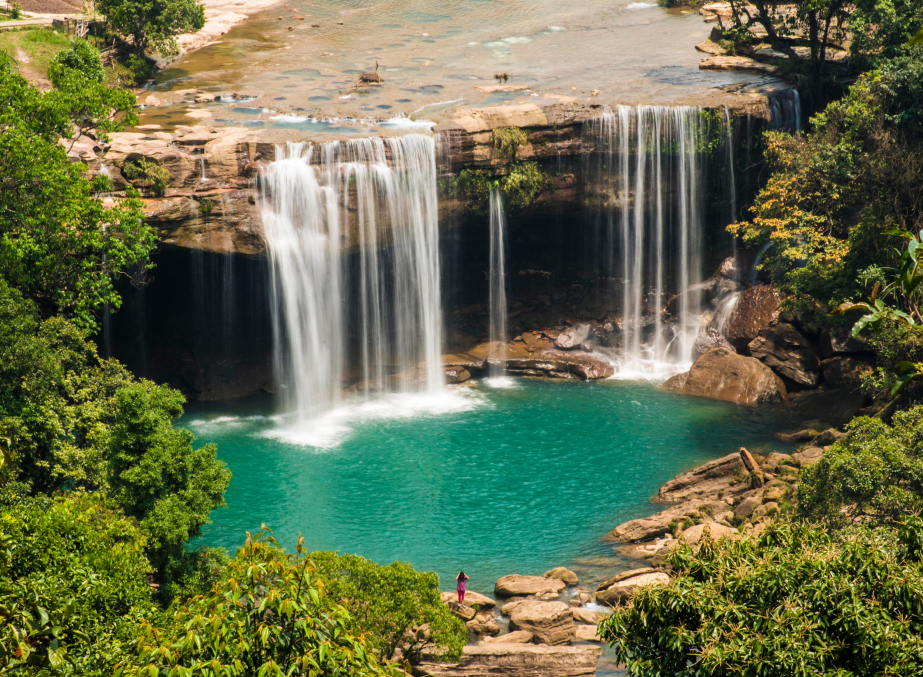
Nestled in the Jaintia Hills, this is a lesser-known but stunningly beautiful waterfall. During August, the monsoon enhances its flow, creating a powerful cascade surrounded by vibrant greenery.
The Trek
A short but scenic trek leads you to the waterfall. Along the way, rain-fed streams and dense vegetation create a magical journey.
Natural Pool
At the base of the falls, a turquoise pool invites visitors to relax or take a refreshing dip.
6. Mawphlang Sacred Grove
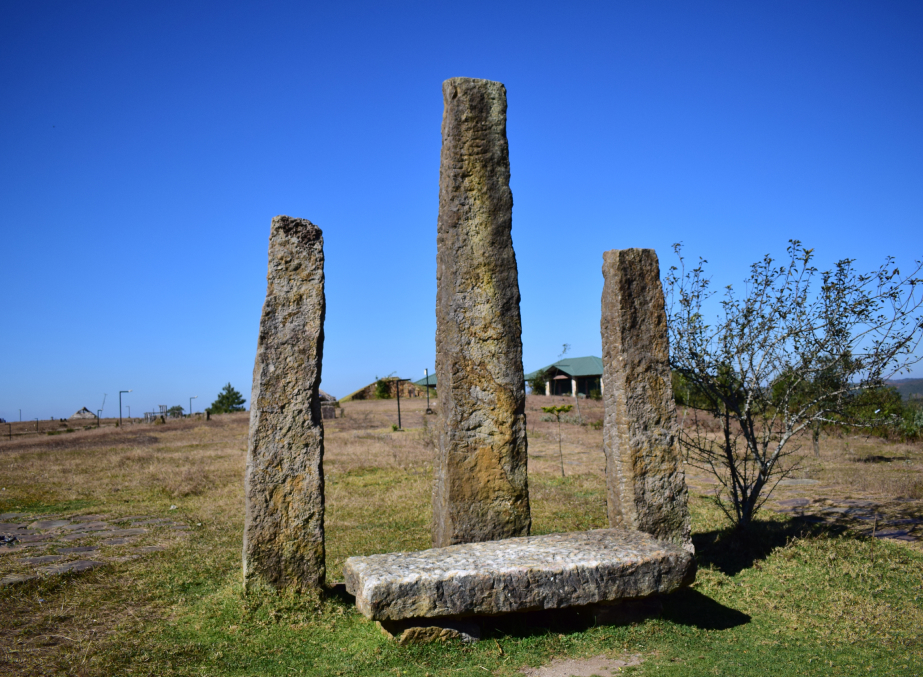
This ancient forest, revered by the Khasi people, is a living museum of biodiversity and tradition. The rains bring out the best in the Sacred Grove and add a mystical vibe to its already enchanting atmosphere.
Guided Tours
Learn about the myths, legends, and traditional beliefs that have protected this forest for generations.
Unique Flora
Rare plants, medicinal herbs, and ancient trees thrive within the grove, creating a one-of-a-kind experience.
7. Laitlum Canyons

Laitlum Canyons, meaning “End of the Hills.” It offers one of Meghalaya’s most dramatic landscapes. In this month, the mist and rain create a delightful ambience, making it a favorite spot for adventurers and photographers.
The Views
Mist-shrouded cliffs and deep valleys create breathtaking vistas, occasionally revealing distant villages and rolling hills.
Trekking
Trails lead down to remote villages, offering a challenging but rewarding experience.
How to Reach Meghalaya in August
By Air:
Guwahati Airport (Lokpriya Gopinath Bordoloi International Airport)
Located 100 km (3 hours) from Shillong, it is the most convenient entry point for Meghalaya. Regular flights connect Guwahati to major Indian cities like Delhi, Mumbai, Bangalore, and Kolkata. Private taxis or shared cabs to Shillong are readily available at the airport.
Shillong Airport (Umroi)
Situated 35 km from Shillong, it offers limited connectivity but is a closer option for travelers arriving from Kolkata.
By Train:
Guwahati Junction
The nearest railway station, located 100 km (3 hours) from Shillong, is well-connected to cities across India. From Guwahati, hire a private taxi (INR 2,500–3,000) or take a shared cab to reach Shillong.
By Road:
Meghalaya is accessible via NH40, which connects Guwahati to Shillong. The scenic route is filled with views of misty hills and green valleys. State buses, private cabs, and self-drive options are available. During August, roads may be slippery due to rain, so it’s best to rely on experienced drivers or rent a sturdy vehicle.
People also Read Sikkim
People also Read Bhutan

Subscribe to us
Subscribe to our newsletter and stay updated

Request a call back
Our experts would love to create a package just for you!
Sikkim Travel Information at a Glance
Find the authentic information on how to plan a hassle free tour to Sikkim. Travalghar puts together for you relevant details on how to reach Sikkim along with information on different means of transportation and the best time to visit. Also explore the different attractions and destinations in Sikkim with the help of our map, made easy for you to navigate.
- About sikkim
- Sikkim Darjeeling Tour Packages
- Visiting Sikkim in Winters
- South Sikkim
- Sikkim Tourism Destinations
- How to Reach Sikkim
- Visiting Sikkim in Summers
- West Sikkim
- Sikkim Tourist Attractions
- Sikkim Travel by Road
- Visiting Sikkim in Monsoon
- East Sikkim
- Best Things to Do in Sikkim
- Sikkim Travel by Train
- Darjeeling Gangtok Tour Packages
- North Sikkim
- Best Time to Visit Sikkim
- Sikkim Travel by Air
- Entry Formalities to Sikkim
- Trekking in Sikkim
- Honeymoon in Sikkim
- Sikkim Tourism Map
- Restricted Area Permit
- Hill stations in Sikkim
- Gangtok Tour Packages
- Sikkim Tour Packages
- Places to visit in Sikkim
- Do's and Dont's















